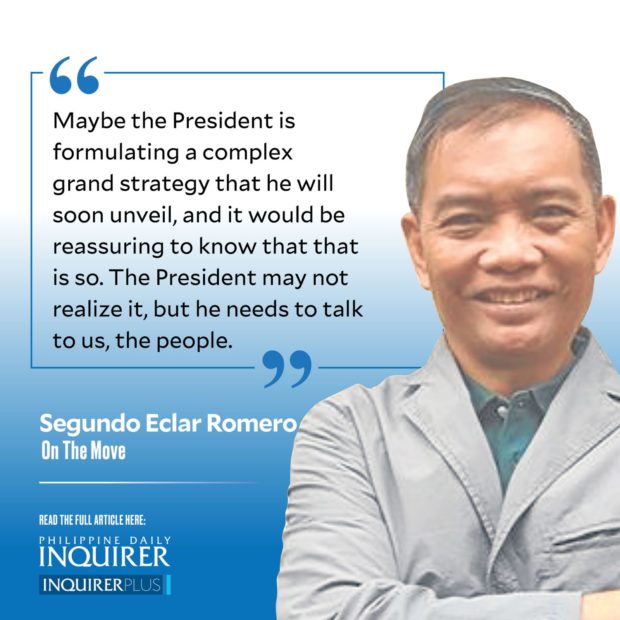Why we need to survey Philippine education
Maybe the President is formulating a complex grand strategy that he will soon unveil, and it would be reassuring to know that that is so. The President may not realize it, but he needs to talk to us, the people.
For instance, wouldn’t it be nice if he can tell us why it is taking almost three months to appoint a secretary of health? What is the nature of his decisional dilemma? Or why a whole Commission on Human Rights (CHR) has not been appointed? What is the nature of his decisional hesitation?
Article continues after this advertisementThe secretary of health is critical in ensuring the Philippines exits from the clutches of the COVID-19 pandemic and similar threats over the next six years. The CHR, on the other hand, signifies the quality of this administration’s institutional and policy response to the horrendous human rights situation under his predecessor, which incidentally mirrored the human rights abuses under Marcos Sr.
Incomplete and inappropriate appointments that are not embedded in a robust and driven strategic framework and orientation have created a pall of strategic drift over the land. There is so much fragmentation in the actions of the government, despite the constant renewal of the vow that the government will take a whole-of-nation approach.
Every top official has a solution or strategy, but there is no clear understanding of the complex web of multilayered Philippine problems. Our officials have failed to do a proper diagnosis of our problems, always in a rush to implement short-term solutions meant to gain political points within the short terms of office of politicians.
Article continues after this advertisementThe country needs a device for keeping the Cabinet, the bureaucracy, and the people on the same page in understanding and confronting our multilayered crises. The Marcos Jr. administration should take a strategic step back and commission a multistakeholder, evidence-based, and systematic process for generating information and understanding of these problems.
The country has a surfeit of knowledge, talent, expertise, commitment, and experience to organize and deploy a Presidential Commission to Survey Philippine Education to diagnose the most upstream of these problems—the lack of quality and inclusive Philippine education. It is about time; it has been over 50 years since the landmark 1970 Presidential Commission to Survey Philippine Education.
There are so many unresolved questions about Philippine education. What is the level of knowledge, skills, and orientations of Filipino students in relation to Philippine and international standards for various levels and subjects? How have curricula, teaching and learning materials, teacher quality, school management quality, school infrastructure, equipment and logistics, coordination, cooperation, and interoperability with relevant government, private, and community institutions contributed to current student performance levels? What are the best practices and lessons learned from the various educational transformation initiatives undertaken at local, regional, and national levels?
The main reason for this commission is that we need to more fully diagnose the dimensions of Philippine education across the archipelago in the wake of the COVID-19 pandemic. We have conducted education sector and program-focused studies in the past, but they have had limited traction in policy and implementation. This country needs a fresh and more holistic empirical study moving forward.
The second reason is the lack of sufficient and actionable data on the results of the implementation of the K-to-12 program. There has been so much expectation of the K-to-12 program (e.g., employability of senior high school graduates), yet the programs and features as implemented have not been fit for purpose. What is the real situation? What needs to be done to successfully implement the program?
A third reason is the need to examine the desirability and feasibility of policies advocated by top public authorities. Vice President and Education Secretary Sara Duterte bats for mandatory ROTC and the need to shepherd Filipino students away from the influence of groups associated with communism and terrorism. The Vice President also states that given an extra P100 billion, she would solve all the problems of Philippine education in six years. This is one brash ballpark estimate that cries to be validated.
A fourth reason is the seeming lack of responsiveness of public policy to the expressed needs of teachers for better pay and working conditions, as well as the concerns of parents about the inputs to the education of their children.
A fifth reason is the unrecognized structural disasters happening in the education sector, especially the incremental collapse of private educational institutions. Such institutions have played a vital role in providing capacity multipliers as well as quality education, and their loss may be difficult to avoid without timely, relevant, and adequate government assistance.
The greatest danger faced by Mr. Marcos and his top officials is the presumption that they know the nature, depth, scope, and interlocking causes of the problem of education that besets our people. A commission to survey Philippine education might just help save them and the country from a slew of unforced errors.
















